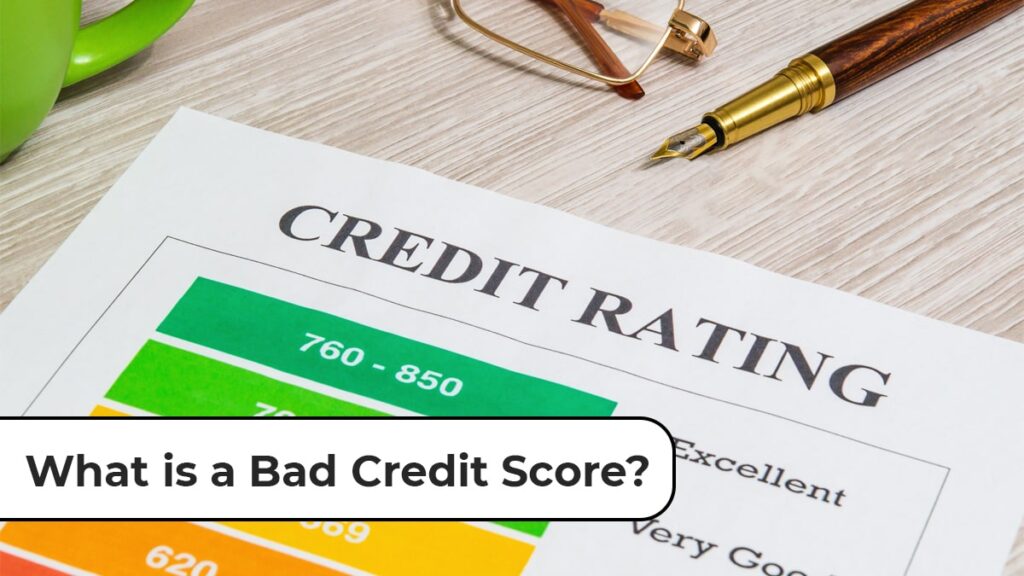A credit score serves as a critical indicator of an individual’s financial health, influencing various aspects of their financial life. It reflects their creditworthiness and is often used by lenders to assess the risk of extending credit to them.
Having a bad credit score can have significant repercussions on one’s financial well-being as loans and other financial instruments will become difficult to secure.
When you understand the how credit system works then you will be able to manage your credit score and your profile better which will improve you chance your creditworthiness.
In this article, we will discuss What is a Bad Credit Score, factors Impacting Credit Score, the risks associated with having a bad credit score, and much more.

What is a Bad Credit Score?
Credit scores are used by lenders to evaluate an individual’s creditworthiness and ability to repay debts. A bad credit score refers to a low score assigned to an individual’s creditworthiness indicating a higher risk of defaulting on loans and other credit obligations.
A bad credit score is often the result of missed payments, high debt utilization, bankruptcy, foreclosure, or other negative financial events.
Having a bad credit score can make it difficult to qualify for loans, credit cards, or favorable interest rates. The following are some of the different credit score ranges-
| Bad | 300-500 |
| Average | 550-650 |
| Good | 650-750 |
| Excellent | 750-900 |
Risks Associated with Bad Credit Score
The following are the risks associated with a bad credit score-
- Individuals with bad credit scores are risky customers for lenders therefore they are hesitant to approve loans or credit cards although you can still get a loan with a bad credit score
- Individuals with bad credit scores get money with higher interest rates and borrowers end up paying more in interest over time
- Individuals with bad credit scores may have fewer options when it comes to financial products and services
- Some employers conduct credit checks as part of the hiring process, particularly for roles that involve financial responsibilities. A bad credit score could potentially affect job prospects or advancement opportunities
- A bad credit score could result in difficulties securing rental housing or require individuals to pay higher security deposits
- Individuals with bad credit scores may end up paying higher rates for auto insurance, homeowner’s insurance, or other types of insurance coverage as some insurance companies use credit scores to determine insurance premiums
Factors Impacting Credit Score
The following are the factors impacting credit score-
Payment History
Late payments, missed payments, or defaults on loans or credit cards can significantly lower a credit score. Your credit history plays an important role in determining your credit score, with timely payments demonstrating responsible financial behavior. However, any instances of missed or late payments can negatively impact your credit report and lead to a decline in your credit score.
Credit Utilization Ratio
This refers to the amount of credit being used compared to the total credit available. High credit utilization can indicate financial strain and negatively impact a credit score.
Length of Credit History
The length of time accounts have been open and active can influence credit scores. Longer credit histories generally have a positive effect on credit scores.
Credit Mix
Having a diverse mix of credit types, such as credit cards, installment loans, and mortgages, can positively impact credit scores. It demonstrates responsible management of different types of credit.
New Credit Inquiries
Applying for multiple new credit accounts within a short period can raise concerns about financial instability and temporarily lower a credit score.
Total Debt
The total amount of debt owed, including credit card balances, loans, and mortgages, can impact credit scores. High levels of debt relative to income can be seen as risky and lower credit scores.
FAQ
A credit score is a representation of an individual’s creditworthiness, based on their credit history. It’s important because lenders use it to assess the risk of lending money to borrowers.
Your payment history, including the timeliness of payments on credit accounts like loans and credit cards, is a significant factor in determining your credit score. Late payments or defaults can negatively impact your credit score loan and this may show up for more than five years in your credit report.
Each time you apply for new credit, a hard inquiry is recorded on your credit report. Too many inquiries within a short period can lower your credit score, as it may indicate financial stress or a high risk of default.
Some steps to improve your credit score include making timely payments, reducing credit card balances, avoiding opening multiple new credit accounts, and regularly monitoring your credit report for errors and reporting it.
It’s recommended to check your credit report at least once a year from each of the three major credit bureaus (Equifax, Experian, and TransUnion) to ensure accuracy and identify any potential issues.



